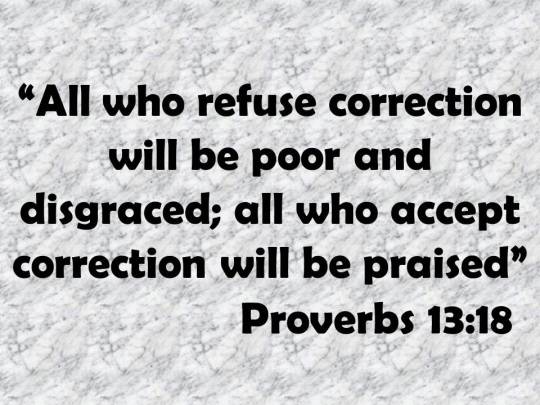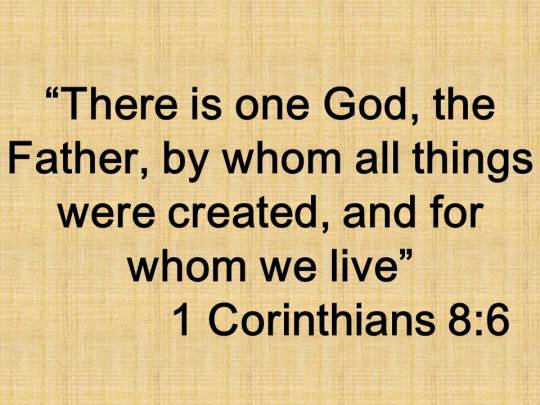Text
The Book of Proverbs in the Bible, after explaining the importance of wisdom in its first section, begins in its second part to develop what is known as the first collection of Solomonic proverbs. These proverbs are essentially an extension of the Psalm 1, the Psalm of the two ways, and they metaphorically express the rewards that await man according to the spiritual path they choose, the righteousness or the sin.
And the book of Proverbs as a synthesis or summary of many teachings of the Bible explains the importance of cultivating a heart of flesh towards God and the neighbor, avoiding the hardness of the heart with this phrase: "All who refuse correction will be poor and disgraced; all who accept correction will be praised" Proverbs 13:18.
And an example of this teaching in the sacred scriptures was Rehoboam who in the assembly of Shechem did not know how to follow the advice of the wise men of Israel and as a consequence of his errors lost half of his Kingdom. Rehoboam, because of his hardness of heart, was not praised by men or blessed by God.
Another example was King Ahab of Israel who did what was evil in the eyes of God, and when he decided to go to war he ignored the advice of the prophet Micaiah, who prophesied his death, as a consequence of his error he fulfilled the prophecy and the proverb, by suffering a great misfortune.
But on the other hand, King Hezekiah of Judah, because of his fear of God, knew how to follow the words of the prophet Isaiah and thus was able to achieve victory in a very difficult situation, emulating his ancestor David when he defeated Golat. Hezekiah due to his common sense received the praise from men and the immortality from God. In synthesis, the ability not in people to accept correction is what determines assertiveness in decisions.

0 notes
Text
The Bible with its stories constantly emphasizes that man's life and his destiny fundamentally depend on his ability to make assertive decisions. Because God made man a free being and according to how the mind discerns, there is the choice between life and death, and as a sapiential book explains: "God in the beginning created human beings and made them subject to their own free choice" Ben Sira 15:14.
And the Book of Proverbs teaches that among the ways for man, the best is the way of the fear of God because in the fear of God is that life that ensures the true goods for man. The spiritual gift of fear of God is defined as constancy, firmness, devotion, equanimity, and stability; the fear of God is that heart of flesh that guides men to the supreme good that is God. And this is why this sapiential book leaves to the Bible readers with a proverb of wisdom to reflect on: "Whoever fears the LORD has a secure fortress, and for their children it will be a refuge" Proverbs 14:26.
And an example of this teaching was in the Bible which is known as the Rebellion of Korah, when Moses led the Israelites towards the land of Canaan. Korah was a Levite who along with Dathan and Abiram rebelled against Moses and rejected his authority, accusing Moses of leading the whole community into disaster.
The Bible relates that Kore and his followers, for having despised the fear of God and given themselves over to impiety, were punished by God with death, they and their families; according to the Bible story, the earth opened and all sinners were taken alive to the realms of death.
With this God divided those who feared God and those who did not, and thus only those who faithfully followed Moses could inherit the land, they and their children.
The fear of God is ultimately the true spiritual guide and protection for man.

0 notes
Text
The Second Book of Chronicles begins its story by leaving one of the most important teachings of the Bible, how important it is to ask God for wisdom to achieve true peace and happiness, and the book did it so by relating how Solomon in Gibeon asked God for wisdom in a dream to govern Israel.
And the Book, with a certain idealism, continues its story showing King Solomon, David's successor on the throne of Israel, as a model of person and example to follow. And this had a spiritual sense, Solomon with devotion was the one who had to carry out the task of building a house for the God of Israel.
And the book also recounts one of the most exciting moments in the life of this glorious and immortal king, when after taking the Ark of the Covenant to the temple he had to give an important speech before the assembly, where he highlighted God's blessing to him and his family:
"My father David had it in his heart to build a temple for the Name of the LORD, the God of Israel. But the LORD said to my father David, ´You did well to have it in your heart to build a temple for my Name. Nevertheless, you are not the one to build the temple, but your son, your own flesh and blood—he is the one who will build the temple for my Name.´
´The LORD has kept the promise he made, I have succeeded David my father and now I sit on the throne of Israel, just as the LORD promised, and I have built the temple for the Name of the LORD, the God of Israel.´" 2 Chronicles 6:7-10.
This important story of the Sacred Scriptures is a reminder that it is up to the wise man to order society to its greatest good, which is God.

1 note
·
View note
Text
The beginning of wisdom is the fear of God, the sapiential books of the Bible, like the Book of Ben Sira, teach with insistence to men. And the spiritual gift of fear of God is defined as constancy, firmness, devotion, equanimity, and stability; in more practical terms, through this beautiful spiritual gift, men can see the world with the eyes of God.
This is why the thoughts of a person gifted with the perfection of wisdom by God are not on frivolous, superficial, or fleeting things, but on the highest and most perfect good of all. The thoughts of a wise man are precision and accuracy, and when the spiritual discernment of a wise man is heard with attention it can enlighten the minds and hearts of common and simple people.
This is why the wise man left a beautiful reflection to take into account and not forget, no matter how powerful and blessed men are, God's plans are above any human limitation, and in this way he expressed himself: "The life of a man is numbered by days, but the days of Israel are without number" Ben Sira 37:25.
With this statement, Ben Sira wanted to reflect on the poverty of spirit, which was taught by Jesus in the Sermon on the Mount, and that is necessary to understand the wisdom and the mysteries of God. In a few words, Ben Sira explained that God's designs are often unfathomable like the character Job, in the Old Testament, who could not understand God's providence in the face of the unfortunate events that were occurring in his life. The desires and passions of men are temporary but the promises of God are eternal, this is the idea that the wise man wanted to leave.

0 notes
Text
The teacher of wisdom Ben Sira left important teachings of practical wisdom to live by, but also among his texts that are written in his sapiential book without a pre-established order, there is a prayer addressed to God for the reestablishment of his promise called Israel.
This plea added by the wise man was probably written during the captivity in Babylon, and it expresses the desires of the exiled Jews to recover what was lost and a desire for divine justice against the oppressing nations.
The prayer begins with a recognition of the omnipotence of the God of Israel over all creation, and a devout supplication for providence to manifest God's love over Israel:
"Have mercy upon us, O God of all,
and put all the nations in fear of you.
Lift up your hand against foreign nations
and let them see your might.
As you have used us to show your holiness to them,
so use them to show your glory to us" Ben Sira 36:1-4.
But after this supplication, the request becomes more precise and insistent and asks for the fulfillment of the prophecies given in more ancient times, prophecies that anticipated the re-establishment of the promises of blessing:
"Give evidence of your deeds of old;
fulfill the prophecies spoken in your name.
Reward those who have hoped in you,
and let your prophets be proved true" Ben Sira 36:20-21.
The Psalm ends with the affirmation that God is faithful and despite the errors of men, the creator of all things does not forget his devotees, and because in the end God has a plan that must be recognized by all nations:
"Hear the prayer of your servants,
according to your good will toward your people.
Thus all the ends of the earth will know
that you are the eternal god" Ben Sira 36:22.

0 notes
Text
The epistles written by Paul show a very interesting sight at what the early days of the early Church were like. And an interesting example of how the Church developed after the death of Jesus was the situation that Paul described in his first and second epistle to the Corinthians.
After the founding of the Church, rival factions were formed, mainly between the richest and poorest people in the city which meant an incoherence regarding the preaching of the gospel and the communion, the ethical order of society. Faced with this, Paul wrote his first epistle to the Church of Corinth to alert the community of the errors and guide them on the true path of righteousness and faith.
After this Paul made a brief visit to the community with which he was saddened and disappointed, but over time he received good news from his disciples, with which Paul addressed his second epistle to them as a way of reconciliation and friendship.
In this second epistle, Paul tried to teach the principles for understanding the Kingdom of Heaven, the dominion or empire of the divine excellencies. The Kingdom of God is above all the search for the perfections of God to reach that complete man that Jesus spoke of in the gospels: "And so we also pray that you will become perfect" 2 Corinthians 13:9.
And this is so because the love of Christ called agape in Greek is the edifying, progressive, gradual, and benevolent love. This is why Paul explained to the believers of the Corinthian church the reasons why he, as an apostle, preached the gospel of our Lord: "We speak in Christ before God, but all things, beloved, for your edification" 2 Corinthians 12:19.
And following the teachings of the Kingdom, Paul concluded his letter by requesting the true goods of this divine dominion or empire, the love and the spiritual union: "The love of God, and the communion of the Holy Spirit be with all of you" 2 Corinthians 13:13.

0 notes
Text
The times of the early Church were times during which the transmission of the gospel was fundamentally oral, there were no written gospels, Paul's missionary journeys took place between 47 and 53 AD, and the first gospels were written around the 1st century after Christ, this fact caused that many Christian preachers removed or added things from the life of Jesus as they saw fit.
This is why Paul asked the first Christians of the Corinthian Church in his first letter to that community to remain faithful to the gospel that he had preached to them upon his arrival in that city.
And with these words, he referred to the issue:
"Let me now remind you, dear brothers and sisters, of the Good News I preached to you before. You welcomed it then, and you still stand firm in it. It is this Good News that saves you if you continue to believe the message I told you—unless, of course, you believed something that was never true in the first place" 1 Corinthians 15:1-2.
And Paul, to strengthen the new believers in his testimony of the faith, resorted to that truth and humility that are born from the teachings of Christ. This is why Paul wisely, to become first, became the last and to be the leader, he became a servant of all.
And in this way the Apostle remembered an important teaching about the Kingdom of God, being the last of all the apostles, he was chosen to be the apostle of the children of Israel according to the spirit:
"For I am the least of the apostles and do not even deserve to be called an apostle, because I persecuted the church of God. But by the grace of God I am what I am, and his grace to me was not without effect. No, I worked harder than all of them—yet not I, but the grace of God that was with me" 1 Corinthians 15:9-10.
This teaching of Paul is a reminder that arrogant men who appropriate the truth are rejected by Jesus and that the only way to the truth is humility.

0 notes
Text
The Sacred Scriptures with their stories constantly teach one principle, and that is the principle of the two ways for man, one that leads man to happiness and blessedness, and another path that leads man to his ruin and unhappiness. As the Psalm 1, the Psalm of the Two Ways explains: "For the LORD watches over the way of the righteous, but the way of the wicked leads to destruction" Psalm 1:6.
And there is a story in the Second Book of Chronicles that confirms this teaching; with the death of King Solomon, his son and successor Rehoboam failed to maintain the unity of the Kingdom, which caused the division between the Kingdoms of Israel and Judah. In this way, only the tribes of Judah and Benjamin remained with Rehoboam, the others, however, crowned Jeroboam king of Israel.
But as a consequence of this, Jeroboam imposed idolatry in Israel, creating two golden calves as gods. In this way, the children of Israel had to choose between two paths, the idolatry towards false gods or the worship of the only God who brought them out of Egypt.
Foolishness or the fear of God became opposite paths that no one could avoid to choose; as a result of this sin of Jeroboam, the existence of the Kingdom of Israel was very brief and only the tribe of Judah could survive, and thus the teaching of Psalm 1 was fulfilled.
In this way, the Second Book of Chronicles in the Bible, tells how this serious religious schism that divided Israel began:
"The Levites even abandoned their pasturelands and property and came to Judah and Jerusalem, because Jeroboam and his sons had rejected them as priests of the Lord when he appointed his own priests for the high places and for the goat and calf idols he had made.
Those from every tribe of Israel who set their hearts on seeking the LORD, the God of Israel, followed the Levites to Jerusalem to offer sacrifices to the LORD, the God of their ancestors. They strengthened the kingdom of Judah and supported Rehoboam son of Solomon three years, following the ways of David and Solomon during this time" 2 Chronicles 11:14-17.

0 notes
Text
The Book of Proverbs was probably composed over a long period of time, which allowed many teachings to be written in the form of principles or maxims based on historical facts from the Bible.
And one of the maxims of this book written in the first collection of Solomonic proverbs shows the importance of wisdom, and even more so when it comes to people with power: "A king delights in a wise servant, but a shameful servant arouses his fury" Proverbs 14:35.
The Old Testament teaches that there is no more important figure than the King and the prophet. And the destiny of kings, as the Bible teaches, has often depended on the foolishness or wisdom of their servants and advisors.
The book of Genesis tells us that Joseph's wisdom pleased Pharaoh, and this wisdom not only allowed Joseph to divine a terrible dream that afflicted Pharaoh but also to correctly administer the Kingdom of Egypt, which allowed this country to endure a terrible famine that affected that country.
Hezekiah, the King of Judah, when he saw his city, Jerusalem, besieged by the tyrant Sennacherib, ruler of the Assyrian empire, saw his hope realized through the wisdom of the prophet Isaiah, which allowed him to resist until he obtained victory.
As these stories show and as the Book of Proverbs teaches, the success of many kings has depended on the wisdom of sensible servants, and that is why these kings have given them their favor; but the opposite has also happened, from the foolishness of some servants, many kings have suffered great setbacks, what unleashed the fury of these rulers. Like when King Artaxerxes, poorly advised by an unfaithful official named Haman, was about to commit a grave injustice against the Jews, as recounted in the book of Esther. These stories leave a clear message, the wisdom of God is priceless because with her lies happiness and the true life.

0 notes
Text
The prophet Hosea was a minor prophet who preached at approximately the same time as the prophet Isaiah, but unlike Isaiah, Hosea preached in the kingdom of Israel. Unlike the Kingdom of Judah which remained faithful to the Davidic dynasty, the Kingdom of Israel declined due to the religious schism created by King Jeroboam with a succession of dynasties that lasted a very short time after violent murders. Of the two kingdoms, the Kingdom of Israel was the most affected by corruption and decadence, which led to its destruction due to the expansion of the Assyrian empire in the Middle East.
For Hosea, these were difficult times, but that did not prevent the prophet from recording his teachings and oracles in the book that bears his name. The literary style of the prophet was very interesting, he was the first prophet to speak of the relationship between Israel and God as a relationship of love, like between husband and wife; with this, Hosea left deep spiritual marks on the Christian religion, because Hosea's teachings were reinterpreted in the light of the relationship between Christ and the Church.
But Hosea's teachings do not end this way, Hosea also had a style very similar to the sapiential books such as Proverbs and Ben Sira.
This is why the prophet taught a beautiful beatitude, with which he called Israel to follow the path to God:
"Plant the good seeds of righteousness,
and you will harvest a crop of love.
Plow up the hard ground of your hearts,
for now is the time to seek the LORD,
that he may come
and shower righteousness upon you" Hosea 10:12.
Men reap what they sow, the prophet taught, no one is immune to the ethical laws of the universe, and this is something typical of the sapiential books. The prophet Hosea called Israel to seek that good path that leads to happiness because the opposite path deceives man's reason and leads men to their destruction.

0 notes
Text
The Book of Judges tells the story of one of its most notable characters, Samson, hero of Israel. After the arrival of the Israelites to Canaan with the prophet Moses, and the beginnings of the conquest of the promised land with Joshua, the judges were established as the first aristocracy of the new country.
The judges ruled in a difficult time and spiritually sustained the Israelites, freeing them from their oppressors and preventing them from falling into the idolatry of the conquered nations. But the Bible relates that the Israelites did what was evil in the sight of God, by abandoning the law of Moses and despising the fear of God, and so the Lord handed them over to the oppression of the Philistines, and they oppressed the Israelites for forty years, and it was in those times that Samson was conceived by the grace of God to be a Nazirite. This is how the book of Judges tells how Samson grew in the grace of God: "The woman gave birth to a boy and named him Samson. He grew and the LORD blessed him, and the Spirit of the LORD began to stir him while he was a Mahaneh Dan, between Zorah and Eshtaol" Judges 13:24-25.
The Bible especially relates that Samson performed extraordinary feats due to his great strength, he fought the Philistines and defeated them, thus freeing the Israelites from oppression. And also God gave wisdom to Samson so that he could rule in Israel, and about this, the Bible says: "Samson led Israel for twenty years in the days of the Philistines" Judges 15:20.
The Book of Judges ends by explaining that Samson was the last judge before the arrival of the prophet Samuel who anointed Saul as the first king of Israel.

0 notes
Text
The prophet Isaiah began his preaching during the last years of the kingdom of Israel and the rise of the Assyrian empire as a power in the Middle East. Isaiah was fundamentally a prophet of the Kingdom of Judah, and in addition to preaching, he was faithful to the Davidic dynasty and gave the word of God to both Ahaz and Hezekiah, kings of Judah.
Like all the prophets, he taught the people to remain faithful to the law given by God on Mount Horeb, but the nation had hardened their hearts and lost that knowledge of God that comes from the gift of fear of God (constancy, firmness, devotion, and equanimity), as the prophet explained at the beginning of his book:
"The ox knows its master,
the donkey its owner's manger,
but Israel does not know,
my people do not understand" Isaiah 1:3.
The Idolatry from neighboring nations had spread in both Israel and Judah, which, according to the prophet, had caused God to be displeased, as the prophet denounced:
"You, LORD, have abandoned your people,
the descendants of Jacob.
They are full of superstitions from the East;
they practice divination like the Philistines
and embrace pagan customs" Isaiah 2:6.
And this had caused, according to the words of the prophet, that God hid his face from Israel, that is, that God withdrew from the chosen people his privileges as the vineyard of the Lord, God gave Isaiah the vision of the destruction of the kingdoms of Israel and Aram at the hands of the Assyrians, and only the Kingdom of Judah survived because of the intelligence of its king, Hezekiah.
In this situation of uncertainty, as a prophet, Isaiah also knew how to put his trust in God because he knew that God had a providential plan:
"I will wait for the LORD,
who is hiding his face from the descendants of Jacob.
I will put my trust in him" Isaiah 8:17.
The first book of Isaiah is essentially a reminder that abandonment to the law of the Lord leads men down an uncertain and destructive path, only the fear of god with the accomplishment of the law blesses the life of men.

0 notes
Text
Psalm 119 is the longest song and after Psalm 1, the most important in the Book of Psalms. This song is a praise to the glory of God but also a plea to receive that fear of God (constancy, firmness, devotion) that is necessary to make the law bear fruit and reach its fullness, because as the sapiential books teach with great wisdom, the compliance with the formal law is not enough to please God: "Fear God and keep his commandments, for this is the whole duty of man", Ecclesiastes 12:13.
This is why the Psalm 119 begins, in a similar form to the teachings of Jesus in the Sermon on the Mount, with a beautiful beatitude:
"Joyful are people of integrity,
who follow the instructions of the LORD.
Joyful are those who obey his laws
and search for him with all their hearts" Psalm 199:1-2.
Blessedness begins with that heart of flesh dedicated to God and his law, the Psalm emphasizes, and blessedness is something very special because blessedness begins with the understanding of the truth and of that path that is progressive, gradual, and luminous like the Sun that begins during the morning and ends at noon.
This is why the Psalm in its development emphasizes that to love the law and follow it with devotion is to reject all the heresies that distance man from the path of truth, and with these words, the Psalm expressed this fact:
"Keep me from the way of deceit
and graciously give me your instruction.
I have chosen the way of truth;
I have set your ordinances before me.
I cling to your decrees;
LORD, do not put me to shame.
I pursue the way of your commands,
for you broaden my understanding" Psalm 119:29-32.
This meditation and plea on God's law is a reminder that only one path is blessed for man and that truth does not depend on point of view but on what God teaches.

0 notes
Text
In a very interesting way, the apostle Paul explained in his first letter to the Corinthians the main problems that afflicted that incipient Christian community. His texts are a look at that past that marked the birth of the Church after the death of Lord Jesus.
Paul had founded the church of Corinth during his second missionary journey, preaching in that city for more than a year, and after leaving this community and most likely during his third missionary journey with great concern he wrote the first epistle to the Corinthians.
Important divisions had occurred in the community, mainly between rich and poor, and many believers did not know how to act in the face of daily problems when living in a fundamentally pagan environment, such as whether to eat meat sacrificed to idols.
Faced with these disorders, Paul emphasized righteousness as a way of life and gave the Corinthian Christians a principle to strengthen them in the true faith: "All things are lawful, but not all things are profitable. All things are lawful, but not all things edify" 1 Corinthians 10:23.
And Paul continued in his letter that the important thing was not whether to eat food consecrated to idols or not, but to persevere in that faith that saves for eternal life, and with these words, he expressed this spiritual truth:
"There may be so-called gods both in heaven and on earth, and some people actually worship many gods and many lords. But for us, there is one God, the Father, by whom all things were created, and for whom we live. And there is one Lord, Jesus Christ, through whom all things were created, and through whom we live" 1 Corinthians 8:5-6.

0 notes
Text
The Psalm 132 is a song of praise towards the wisdom of God and David's faithfulness to his creator. The Psalm begins by recalling the transfer of the Ark of the Covenant to Jerusalem after the conquest of the city and David's oath to God. After securing the borders of his kingdom, David obtained a time of peace and prosperity that allowed him to begin the project of the first temple of Jerusalem on Mount Zion.
And with these words, the psalm relates how King David with devotion promised a spiritual house for God in the holy city of Jerusalem:
"He swore an oath to the LORD,
he made a vow to the Mighty One of Jacob:
´I will not enter my house
or go to my bed,
I will allow no sleep to my eyes
or slumber to my eyelids,
till I find a place for the LORD,
a dwelling for the Mighty One of Jacob.´" Psalm 132:2-5.
And this promise of David had a response from God, the Lord made a pact with David through the prophet Nathan, God promised King David a savior messiah who would establish a celestial Zion.
With these words the Psalm remembers the Davidic Covenant:
"The LORD swore an oath to David,
a sure oath he will not revoke:
´One of your own descendants
I will place on your throne" Psalm 132:11.
This Psalm has a special meaning for the Christian faith because in its last part, this song anticipates a new covenant between God and men and the arrival of Lord Jesus with the promises of the kingdom of God, the dominion or empire of the divine perfections. And this heavenly Zion, related with Jesus, was especially specified by the apostle Paul in his epistle to the Hebrews; to refer to the new rest of God and to the place to which all those saved in the name of the Lord Jesus are called to go.

1 note
·
View note
Text
The Book of Proverbs in its first collection of Solomonic teachings insistently repeats as a starting point for all its spiritual reflections the existence of the two paths and the two rewards. Because God, established spiritual laws for men with his wisdom from the creation of the world, but since man is a being endowed with reason and therefore capable of choosing whether to obey God or not, this is what causes the existence of the two ways, righteousness ("Do to no one what you yourself hate" Tobit 4:15) and sin. The freedom, it could be said, brings with it the discernments, one edifying, progressive, and benevolent, but the other destructive, chaotic, and unfair: "God in the beginning created human beings and made them subject to their own free choice" Ben Sira 15:14.
But the sapiential teaching does not end here, because the existence of rewards determines one of the most important thoughts of wisdom in the Bible, expressed in the Psalm 1, the Psalm of the two paths: "For the LORD watches over the way of the righteous, but the way of the wicked leads to destruction" Psalm 1:6.
And all the stories in the Bible, from Cain who murdered his brother Abel, to King Hezekiah who with his fear of God (constancy, firmness, devotion) defeated Sennacherib, tyrant of the Assyrian empire, are a demonstration of the validity of this teaching. This is why King Solomon wisely expressed a teaching similar to that of Psalm 1: "No harm overtakes the righteous, but the wicked have their fill of trouble" Proverbs 12:21.
To the science of wisdom corresponds the teaching of the most excellent and the best for man, that is why the wise man left this important thought to remember.

0 notes
Text
The Book of Acts tells how the church of Malta was founded with the eventful arrival of the apostle Paul. The apostle of the Gentiles had been arrested in Jerusalem for preaching the gospel, and as part of his defense, he asked to be tried by the emperor because he was a Roman citizen, and so King Agrippa sent him to Rome after completing his third missionary journey. Paul knew that perhaps the trip to Rome would be his last important trip, and he greatly desired to preach the gospel in the capital of the empire.
The Book of Acts relates that Paul was put on a ship that left Asia bound for Rome, but due to the difficulties of the weather he arrived in Malta due to a shipwreck.
And upon his arrival in Malta, the apostle made a miraculous sign with which the inhabitants of the island confused him with a God, and that allowed the conversion of the first Christians on the island, with these words the Book of Acts relates Paul's sign:
"The islanders showed us unusual kindness. They built a fire and welcomed us all because it was raining and cold. Paul gathered a pile of brushwood and, as he put it on the fire, a viper, driven out by the heat, fastened itself on his hand. When the islanders saw the snake hanging from his hand, they said to each other, ´This man must be a murderer; for though he escaped from the sea, the goddess Justice has not allowed him to live.´ But Paul shook the snake off into the fire and suffered no ill effects. The people expected him to swell up or suddenly fall dead; but after waiting a long time and seeing nothing unusual happen to him, they changed their minds and said he was a god." Acts 28:2-6.
After this, the Book of Acts relates that Paul laid his hands on many sick people and they were healed, and thus the number of converts who were to be saved in the name of Jesus increased.

5 notes
·
View notes